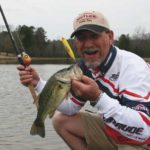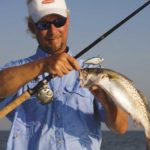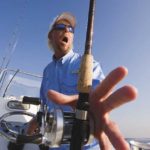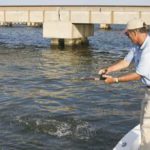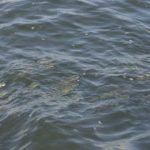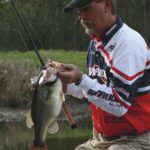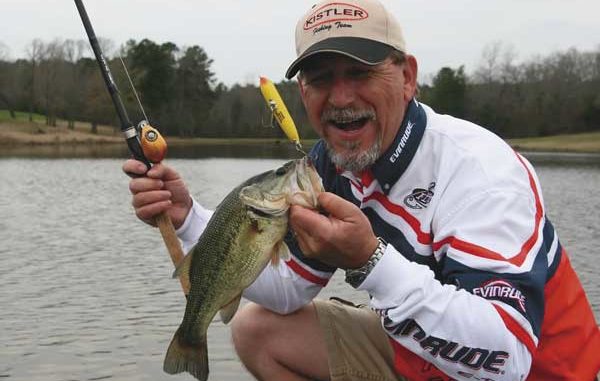
Think you need to be up at the crack of dawn to catch specks and bass? Actually, the bite near dusk is often the best of the day.
Normally, I don’t like receiving personal phone calls at work. I know that concept seems foreign today, since you’re probably standing in line right now waiting on a cashier to hang up so she can check you out. I will admit, though, that there are a couple numbers that I don’t mind showing up on my caller ID during the day. Since I work in Slidell, both of them are Slidell phone numbers, and when I see them appear I know I won’t be making it home in time for supper.
I still don’t answer during the middle of something, but I hit the speed dial during the first break I get.
The first time I got one of these calls was last year. Capt. Greg Schlumbrecht had wanted to know what I was doing after work. I had mowed the yard the day before, my son didn’t have a baseball game and there wasn’t anything going on at church.“Absolutely nothing,” I answered.
“Why don’t you meet me at The Dock?” he asked. “I think we can go out and catch some pretty nice trout this evening. I’ve been on a good evening bite.”
Since that eye-opening evening in which Schlumbrecht and I wound up repeating, “just another 3-pound trout” over and over again, I have come to equate fishing during the evening with deer hunting during the evening.
The theory I have that makes more sense the older I get is that anglers or hunters who wake up way too early to be at their hotspot or tree stand before sunrise have less and less to look forward to as time moves toward noon. Rather than grow excited as each hour passes, they grow more frustrated as the sun gets high and the action slows.
On the other hand, those who sleep in, get a little yard work done and get to their spot around 3 p.m. or so have only good things to look forward to as dark approaches. Rather than sitting there knowing the action is only going to get worse, they eagerly pass each hour knowing that the next is going to be better.
Also, there just seems to be something about fishing during the evening that is unmatched by the morning. It is a bewitching kind of feeling that evokes the inner child in all of us, and it’s almost as if the fish, whether they be freshwater or saltwater, feel the same thing.
The morning? The only feeling I get before sunup is the sudden increased pressure on my bladder, which is valiantly doing its best to discard all the coffee that was required to wake me up.
Yeah, I know there’s something magical about being on the water as the big yellow ball first peaks above the horizon. However it’s just as glorious as it makes its daily departure.
Now don’t get me wrong. Fish can be caught during the middle of a summer day. However, the odds aren’t in your favor as the warming water temperature drives bait and fish into deeper water.
Why do you think so many anglers work so hard to get their limits so early in the morning, though? It’s so they can get back to their air-conditioned camps and lay low during the heat of the day. Fish are pretty much the same way — they want to cool off and lay low during the heat of the day.
Just like an angler’s nap will end right before they feel the urge to move around and get some supper, fish get the urge to eat again as the evening hours arrive. According to Capt. Eric Dumas with Living A Dream Guide Service on Lake Pontchartrain, it’s not so much that fish get hungry as it is their food simply presents such an easy target.
“I don’t see the bait very much during the day on the lake,” said Dumas. “As the sun starts getting low, though, there is no mistaking the fact that the pogies and mullet group up and move to the surface by the bridges. When the bait does that, the trout know it’s time to move up and grab something to eat.”
Many evenings fishing Lake Pontchartrain have taught Dumas that, besides the bait grouping up and moving to the surface, there is a distinct evening tide that more often than not is coming in rather than going out.
This incoming tide during the evening puts the bait and the trout on the western side of the bridges where Dumas targets them most frequently with live bait. With the fish feeding, he concentrates on fishing underneath the pods of visible bait.
“I tend to fish mainly under the big rafts of mullets,” he said. “You don’t see them much during the day, but during the evening, they’ll come up and start swimming around with their heads sticking up above the surface. I’ve found the best bet to be fishing live bait — croakers or shrimp — under a sliding cork.”
The amazing thing that Dumas and Schlumbrecht have discovered about fishing Lake Pontchartrain during the evening is that they frequently find themselves to be the only boat on the lake. Considering how close the lake is to so many avid anglers, this can come as quite a shock to those who first experiences it.
“I think that’s the No. 1 advantage to fishing during the evening,” said Schlumbrecht. “When you’re out there in the morning, you have to weave in and out of all the boats that are tight to the bridge. All those boats are a non-factor during the evening.
“I fish the evening a good bit during the summer, and I also offer evening guide trips this time of year. We have the run of whatever pilings we want to fish, and we’re undisturbed.”
Schlumbrecht feels so few anglers fish the evening because they either get so caught up in believing the misconception that fish only bite during the morning or they are so in the habit of making plans for the evening that keep them from getting out on the lake.
According to Schlumbrecht, there isn’t that much difference between fishing the lake during the morning or evening other than the lack of fishing pressure later in the day. He equated the bite to bass fishing in that there are two distinct bites, morning and evening.
“The evening bite is so similar to the morning bite, with the exception of maybe a different tide, that I approach evening fishing the same way I do morning fishing,” Schlumbrecht said. “Locating the bait will help you locate the fish. Then it’s simply a matter of getting your bait in the water around the bait. And being able to work such a large stretch of the bridges without having to weave in and out of boats is a big plus.”
Speckled trout aren’t the only fish that turn on during the evenings during the summer, though. For many of the same reasons, bass go on a feed just before sunset, which makes it an ideal time to be on any freshwater lake or river.
Like Dumas and Schlumbrecht, Sid Havard from Simsboro believes the expectation of the bite getting better each hour leading to darkness is one of the primary reasons he launches his boat at 4 p.m. rather than 4 a.m.
“I kind of hate to admit this,” he said, “but the older I get the more geared I am toward going in the evening so I don’t have to get up before sunrise. One of the differences I can see between freshwater and saltwater, though, is that bass fishing during the evening is based a lot on fishing the shadows that are cast by the sun setting in the west. Because of that, the shadows start to grow on the western side of the lake, and that’s where I start fishing.”
Bass position in these shadows because it gives them a point of ambush. What a lot of anglers may not realize is that a shadow is just as much an ambush point as a stump would be during the summertime. They will use the edge of the shadow the same way they use the edge of a grass line in that they will get just on the inside of the line and wait for bait to swim by on the other side of this edge.
“The other thing is when you go during the evening, you don’t seem to be as rushed,” Havard said. “If you are running late in the morning, you tend to get aggravated if you aren’t at your spot at the first crack of daylight. If something happens and you get there late, you’ll spend much of the morning one step behind yourself.”
On the other hand, evenings present a more laid-back style of fishing in which the artificial deadlines of the world seem to melt away. It’s a more-relaxed style of fishing, and by the time you get there during the evening, all those aggravated morning anglers are getting out of the water, which, like in salt water, is going to pretty much give you the run of the lake until dark.
“Bass know it’s time to eat during summer evenings,” Havard said. “What I like to find is where deep water runs up next to shallow water. We see this situation a lot in North Louisiana where we have creek channels that bend in toward the bank. You can bet that’s where the fish are going to come in. They may disperse everywhere, but that’s going to be their trail into the feeding ground.”
One situation that Havard has seen time and time again during the evening hours is bass will often run in to a shallow flat like the top of a hump or the edge of a channel bend for maybe 10 or 15 minutes to eat. Then they’ll run back out to the deeper, cooler water to digest whatever they eat before they transition right back up to the shallow cover again.
“That’s why a lot of evening bass fishing comes in spurts,” he said. “I can’t tell you how many times I’ve fished the top of a hump at Caney Lake and caught two or three in about 10 minutes only to go 30 minutes without another bite. Then it’s like somebody flipped a switch again, and they’ll turn on for another 10 or 15 minutes.”
Being that there are some bass that stay shallow all summer long, Havard said these isolated fish act like they get a shot of Vitamin B12 with a one- or two-degree difference in water temperature. Bass that had been sulking in the shadow of a cypress tree suddenly feel the desire to roam around more to see what’s available to eat.
“These roaming fish definitely respond better to lures that cover a lot of water,” Havard said. “Rather than pitching a plastic or jig to a stump or tree, you want something that’s going to give you more chances of putting your lure in front of a fish.
“I won’t go fishing in the summer without a topwater frog like a Ribbit. Lures like this that can cover water and attract bass from a long distance are a definite plus during the evenings. Spinnerbaits and shallow-diving crankbaits are also good choices.”
The evening hours, whether you’re fishing salt water or fresh water, are no doubt some of the best hours to be on the water during the summer. Many of the other anglers are gone, most of the jet skis are gone, and much of the stress of the day is gone.
However, the fish aren’t gone. In fact, if anything, they are there in more abundance, or at least it seems like they are. When you can get on a school of feeding trout or a group of hungry bass, and have them all to yourself, you’ll wonder why you didn’t get in on these eventful evenings sooner.
There’s no better time to be on the water.
Capt. Greg Schlumbrecht can be reached at 985-960-1709, and Capt. Eric Dumas at 985-705-1244.
